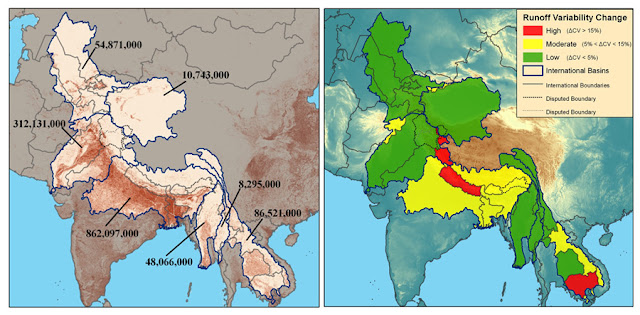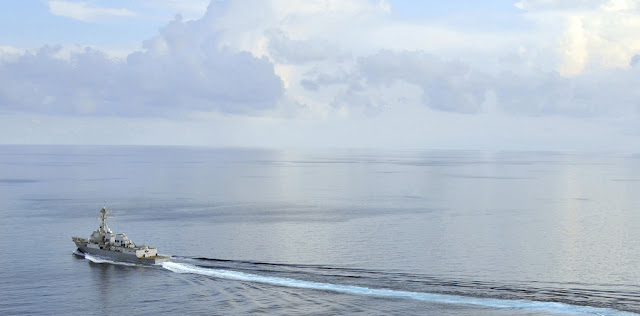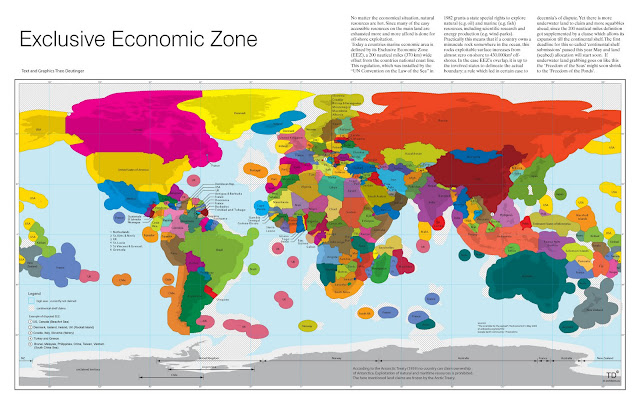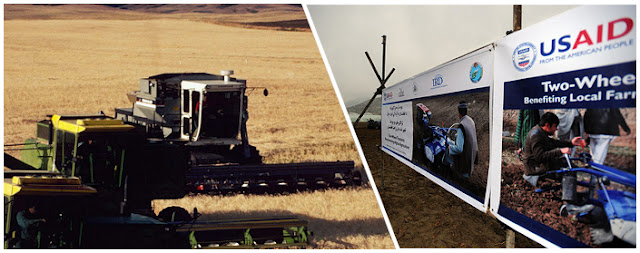-
‘Dialogue’ TV: Revisiting Mr. Y and “A National Strategic Narrative”
›“We are, what I would call, very non-linear thinkers,” said U.S. Navy Captain Wayne Porter about the white paper he co-authored with U.S. Marine Colonel Mark Mykelby, “A National Security Narrative,” launched by Woodrow Wilson Center President Jane Harman at the Center in April. “We’re almost incapable of restricting ourselves to defense and security in isolation from a much larger perspective,” he told Dialogue TV.
“I think maybe that’s why Admiral Mullen has kept me around – I can offer a perspective that maybe he wouldn’t get from conventional strategists or from conventional planners,” said Porter, who served three out of four tours with the current chairman of the Joint Chiefs of Staff as a special assistant for strategy.
Dialogue host John Milewski sat down with Captain Porter and Robert Litwak, director of International Security Studies and vice president for programs at the Wilson Center, for a discussion about the white paper – published under the pseudonym “Mr. Y” (echoing George Kennan’s seminal “X” article) – and its contention that the United States should move away from an outmoded Cold War-era model of containment, deterrence, and control towards a “strategy of sustainability.”
The narrative has been well received, Porter said: “I think there is an appreciation that it’s a very complex strategic environment that we live in now and that maybe we need to re-look at all of the tools that we could use as a nation to pursue our enduring national interest.”
Inflection Points in History
“The timing of such conversations is cyclical,” said Litwak. “The original ‘X’ article emerged from the end of the Second World War and the advent of the Soviet threat, which required a new conception of international relations that Kennan articulated, as well as the National Security Act of 1947 to line up the U.S. government with this new environment.”
There have also been periods of concern about American decline. “I think what one sees in the current era are both of those trends coming together,” Litwak said:The system is changing – it’s a debatable proposition that the United States is in decline – but we see in the international system rising powers, notably China, as well as transnational trends that are beyond the sovereign control of any single state, which have called into question the nature of the international system…as well as a sense that…there’s something qualitatively different about this recession than the typical economic, cyclical recession and that has to do with the domestic sources of American strength.
These conditions, as well as the source of argument – coming from the military – combined to give particular resonance to the piece, Litwak said.
The Information/Globalization Age
“I think the thing that has changed materially to us is that the information age has brought about an awareness that our environment is completely interconnected,” Porter said. “There’s a complexity to this that can’t be analyzed linearly, that has to have new tools applied.”
“I’d honestly characterize it as significant as the Enlightenment in the 1600s,” he said.
“Certainly we’ve thought in silos and debates have been too often compartmentalized,” Litwak said. “One of the strengths of this piece is that it is truly synthetic – working across the continuum of instruments of power – and talks in a really powerful way about how hard power…has its place, but that the non-military dimensions of American power have been neglected.”
But, Porter said, it’s important to focus on being proactive, rather than reactive:The thing that bothered us most about the strategies that we see every day in our jobs on our side of the river and across the river is that they are almost universally based on anticipating and countering known risk and threat, and our sense is that we have entered an age in which we need to overcome that sense of fear and seize the opportunity to shape the environment of the future as opposed to simply being resilient to it.
As Litwak points out, Secretaries Gates (now former) and Clinton – in the form of the Quadrennial Defense Review, Quadrennial Diplomacy and Development Review, and numerous speaking engagements – have both called for closer integration between State and Defense, more resources for non-military levers of power, and more holistic concepts of security. But unfortunately the greater integration called for in these documents remains unrealized.
Dialogue is an award-winning co-production of the Woodrow Wilson International Center for Scholars and MHz Networks that explores the world of ideas through conversations with renowned public figures, scholars, journalists, and authors. The show is also available throughout the United States on MHz Networks, via broadcast and cable affiliates, as well as via DirecTV and WorldTV (G19) satellite.
Find out where to watch Dialogue where you live via MHz Networks. You can send questions or comments on the program to dialogue@wilsoncenter.org. -
Redrawing the Map of the World’s International River Basins
›Understanding why conflict over water resources arises between nations begins with a solid understanding of the geography of international river basins. Where are the basins? How big are they? How many people live there? Who are the riparian nations, and what is the significance of each to the basin?
-
Watch: Aaron Wolf on the Himalayan and Other Transboundary Water Basins, Climate Change, and Institutional Resilience
›When Aaron Wolf, professor in the Department of Geoscience at Oregon State University, and his colleagues first looked at the dynamics behind water conflict in their Basins at Risk study, they found that a lot of the issues they’d assumed would lead to conflict, like scarcity or economic growth, didn’t necessarily. Instead they found that “there is a relationship between change in a [water] basin and the institutional capacity to absorb that change,” said Wolf in this interview with ECSP. “The change can be hydrologic: you’ve got floods, droughts, agricultural production growing…or institutions also change: countries kind of disintegrate, or there are new nations along basins.”
However, these changes happen independently. “Whether there is going to be conflict or not depends in a large part to what kind of institutions there are to help mitigate for the impacts of that change,” explained Wolf.
“If you have a drought or economic boom within a basin and you have two friendly countries with a long history of treaties and working together, the likelihood of that spiraling into conflict is fairly low. On the other hand, the same droughts or same economic growth between two countries that don’t have treaties, or there is hostility or concern about the motives of the other, that then could lead to settings that are more conflictive.”
Wolf stressed the importance of understanding hydrologic variability in relation to existing treaties around the world. After carefully examining hundreds of treaties, he and his colleagues created a way of measuring their variability to try to find potential hotspots.
“We know how variable basins are around the world; we know how well treaties can deal with variability. You put them together and you have some areas of concern: You may want to look a little closely to see what is happening as people try to mitigate these impacts,” said Wolf.
“We know that one of the overwhelming impacts of climate change is that the world is going to get more variable: Highs are going to be higher, and lows are going to be lower,” Wolf said.
Wolf used the Himalayan basins to illustrate the importance of overseeing the potential effects of climate change and institutional capacity. “There are a billion and half people who rely on the waters that originate in the Himalayas,” he pointed out. Because of climate change, the Himalayas may experience tremendous flooding, and conversely, extreme drought.
Unfortunately, Wolf said, “the Himalayan basins…do not have any treaty coverage to deal with that variability.” Without treaties, it is difficult for countries to cooperate and setup a framework for mitigating the variability that might arise. -
Cynthia Brady, USAID
The Specter of “Climate Wars”
›July 29, 2011 // By Wilson Center StaffThe original version of this article, by Cynthia Brady, appeared in the June/July 2011 edition of USAID’s Frontlines.
In 2007, many in the advocacy community rushed to categorize the conflict in the Darfur region of Sudan as a “climate war” in the wake of a compelling United Nations report that emphasized the ways climate change and environmental degradation can drive conflict.
In 2009, international media focused significant attention on an academic study that analyzed historical linkages between civil war and temperatures in sub-Saharan Africa and suggested there would be a 54-percent increase in armed conflicts by 2030. [Video Below]
In both cases, subsequent research and analyses conducted by prominent scholars countered those original claims of such direct climate and conflict connections, at least based on existing evidence. Those studies are two examples of the recent spate of analyses on the subject and serve as cautionary tales against alarmism and overly simplistic assumptions about specific connections between climate change and stability.
The reality is far more complicated.
The science and practice of analyzing the interaction of climate change risk and conflict risk is new and still evolving. As a result, there is little certainty over exactly how climatic change will manifest in specific locations and what the consequences will be for economic development, political stability, and peace and security.
Around the world, climate change likely will create both risks and opportunities, making it critical that development and relief organizations like USAID consider climate change not as a monolithic threat but rather as an important influence within a complex web of environmental and social factors.
Responding to climate change effectively means taking action to reduce the threats. It also means harnessing opportunities by helping people and institutions to effectively cope with and adapt to change – environmental or otherwise. Climate-focused interventions, if conducted strategically and with sensitivity to local context, can produce outcomes for conflict prevention and sustainable development as well.
For example, recent USAID-funded research in the conflict-prone Karamoja region of northeastern Uganda found that engaging local communities in the design and implementation of climate change adaptation activities – for example, promoting shared grazing areas and creating small-scale irrigation systems – holds considerable potential to reduce conflict by building social cohesion and addressing feelings of marginalization and disempowerment among local community members.
Since 2008, USAID has invested in research to better understand how specific climate factors contribute to the risk of conflict and affect the resilience of social structures and institutions. The goal is to build a deeper understanding that will enable the agency and its partners to respond most effectively to climate-related stress, reduce the risk of violent outcomes, and maximize the potential for U.S. foreign assistance to prevent conflict and promote stability.
This knowledge also will help USAID make wise investments as part of meeting U.S. Government commitments under the Global Climate Change Initiative as described in President Barack Obama’s September 2010 Presidential Policy Directive on Global Development.
Climate Change and Conflict Prevention
The research thus far points to climate change as an exacerbating factor in situations where political, economic, and social stresses already exist. The risk of conflict is greatest where there is poor governance and low institutional capacity.
The agency, through its Office of Conflict Management and Mitigation (CMM), has identified two basic scenarios under which climate change could combine with other variables and potentially lead to conflict.
First, climate change could intensify existing environmental or resource problems. For example, a series of droughts could reduce the available local water supply, aggravating competition between farmers and pastoralists in already arid regions. Second, climate change could create new environmental or resource problems that contribute to instability. Changing rainfall patterns, for instance, could damage agricultural production in formerly fertile areas, decimating local livelihoods and causing food insecurity.
There is a third area of potential risk for USAID and other donors as well: namely, that climate-related financing, policies, and programs which have not adequately considered local conflict dynamics and context could produce serious unintended negative consequences.
Climate change-related interventions such as incentive payments to stop deforestation – particularly in fragile states and conflict-affected areas – must recognize that both the money and the power to allocate benefits may inadvertently reinforce the social status quo, shift local power balances, or expose governance failures.
In her field work in Nepal, Janani Vivekananda, a researcher with USAID partner International Alert, recently illustrated how certain types of assistance might inadvertently do harm. She explained how a now-defunct village water tap installed in an effort to mitigate the effects of climate variability, did not appropriately consider the local social, political, and conflict context or even basic environmental parameters. In the end, it contributed to local grievance.
The community had requested the tap to be installed during a period of water stress and three consecutive years of drought. The Government of Nepal sponsored the project just before the elections.
Vivekananda explained: “These people are hand-to-mouth farmers. They didn’t know and they wouldn’t know that ground water levels were falling. They wouldn’t know the negative impacts of uncontrolled surface water extraction and so they chased about this tap, and within three months it ran dry. That was the only cash that was injected into the community for development purposes, and it had no impact whatsoever apart from being a stark reminder that the government itself isn’t doing what it ought to.”
This story highlights the reality that local context will define the outcome of peace or conflict and, thus, as CMM’s discussion paper “Climate Change, Adaptation, and Conflict: A Preliminary Review of the Issues” noted, there remains a pressing need for a more robust, fine-grained understanding of the interaction between climate change and the political, social, and economic realities of conflict-prone areas.
To help fill this information gap, USAID is supporting field-based climate change and conflict research in Peru, Uganda, Ethiopia, and the Niger River Basin in West Africa. At the global level, the agency is improving its ability to integrate climate change considerations into conflict early warning models. It is also establishing academic and practitioner partnerships that explore a wide range of environment and security issues.
Today, close to 60 percent of the State Department’s and USAID’s foreign assistance goes to 50 countries that are in the midst of, recovering from, or trying to prevent conflict or state failure. A significant amount of that assistance is slated for Global Climate Change mitigation and adaptation programming. Yet, as CMM’s conflict early warning specialist, Kirby Reiling, observed, “much of that money could be a lost investment if those countries fall into armed conflict.”
With conflict-sensitive development assistance and with smart climate change policies and programs, vulnerable countries will have enhanced opportunities to build stronger societies and more resilient institutions for sustainable development, peace, and security.
Cynthia Brady is a senior conflict advisor in USAID’s Office of Conflict Management and Mitigation.
Photo Credit: Afghan farmers plow a field guarded by U.S. Marines, courtesy of flickr user isafmedia. -
Rare Earths No More? Mineral Discoveries a Potential Game-Changer for East Asia
›July 7, 2011 // By Schuyler NullDiscoveries announced in a journal article over the weekend may prove a game-changer for global rare earth supplies and recent diplomatic maneuvering in East Asia between China, Japan, Vietnam, and the United States. A team of researchers from Japan’s Agency for Marine-Earth Science and Technology published findings in Nature Geoscience that indicate vast underwater reserves of rare earth minerals are scattered across a huge swath of the Pacific, including south and east of Japan. The U.S. Geological survey estimates current global reserves of rare earth minerals at about 110 million tons; Yasuhiro Kato, the lead author of the Japanese team, told Reuters that the sites surveyed could contain an additional 80 to 100 billion metric tons (yes, with a “b”) of the valuable resources.
The authors write that an “area of just one square kilometer, surrounding one of the sampling sites, could provide one-fifth of the current annual world consumption of these elements.” The team collected data from 78 sites in total, with the largest concentrations centered east of the Hawaiian and Polynesian islands (see a map of the surveyed areas here).
Resource Relationships
The discovery could prove crucial for Japan, as it has been seeking alternative sources of rare earth minerals after an embargo earlier this year by China, which controls 97 percent of the world’s current supply. The embargo (which China denied) was imposed in October of last year after the Japanese navy arrested the captain of a Chinese fishing boat, which was alleged to be encroaching on Japanese territorial waters. China’s response increased tensions across the region and produced a flurry of warnings in Washington over the security of U.S. supplies.
Although the embargo was later lifted, Japan and Vietnam reached an agreement for development of Vietnamese mines in November. The tensions sparked by the encounter also spread to the South China Sea where Chinese, Vietnamese, and Filipino forces have stepped up their jockeying over disputed and resource-rich waters to the highest levels in years. Vietnamese and Chinese naval forces recently held mirror exercises, and Filipino officials invoked a 1950-era defense pact with the United States. Chinese Vice Foreign Minister Cui Tiankai told reporters in June: “I believe the individual countries are actually playing with fire, and I hope the fire will not be drawn to the United States.”
Secretary of State Hillary Clinton called concerns over navigability and Chinese insistence on bilateral (as opposed to multilateral) negotiations in the South China Sea a matter of “national interest” for the United States last year.
The Japanese team’s discovery has the potential to significantly impact the power dynamics behind these tensions. China has used its rare earth monopoly to pressure Japan and the United States, which in turn may have also helped embolden its recent more aggressive maritime policies. If the new rare earth discoveries prove viable, that calculus could change considerably.
However serious questions remain: Many of the discoveries lie outside of established exclusive economic zones, so who has the rights to mine them? They’re also between 11,500 and 20,000 feet below the surface – how long before we have the technologies to extract them at an industrial scale? And how safe – both for humans and the environment – will those processes be? Aboveground rare earth mines are some of the most damaging to the environment – part of the claimed reason China curbed overall exports earlier this year, which drove up global prices and drew the ire of the World Trade Organization.
For more on the importance of rare earth minerals to the defense and electronics industries, see New Security Beat’s “Rare Earth: A New Roadblock for Sustainable Energy?” and “Reading Radar: The Mineral Security of the United States.” For more on the exclusive economic zones map, see “Eye on Environmental Security: Natural Resource Frontiers at Sea;” and on the South China Sea and what it reveals about future diplomatic fault lines between the United States and China, see “U.S. v. China: The Global Battle for Hearts Minds and Resources.”
Sources: Asia Sentinel, The Atlantic, BBC, Government Accounting Office, Nature Geoscience, The New York Times, Reuters, Tech News Daily, U.S. Department of State.
Photo Credit: Adapted from “USS Mustin underway in the Pacific Ocean,” courtesy of flickr user Official U.S. Navy Imagery, and “Exclusive Economic Zone,” used with permission courtesy of Theo Deutinger and TD Architects. -
Watch: Demographic Security 101 With Elizabeth Leahy Madsen
›June 27, 2011 // By Schuyler Null“Today we are in an era of unprecedented demographic divergence, with population trends moving simultaneously in different directions. Some countries are beginning to experience population decline, while others continue to grow rapidly,” says Elizabeth Leahy Madsen, formerly the senior research associate at Population Action International (PAI). In this primer video from ECSP, Madsen explains how global demographic trends affect economic development, national security, and foreign policy.
-
Tate Watkins, Short Sentences
Why Fund Both Farm Subsidies and Foreign Aid?
›June 27, 2011 // By Wilson Center StaffThe original version of this article, by Tate Watkins, appeared on the blog Short Sentences.
The USDA routinely disburses $10 billion to $30 billion a year in farm subsidies. President Obama has allocated $47 billion for the State Department and USAID for the next fiscal year (not including proposed expenditures for Afghanistan, Iraq, and Pakistan).*
Why does the U.S. simultaneously fund domestic agricultural subsidies and foreign aid? The policies oppose each other. When it comes to promoting development opportunities for farmers around the globe, one of USAID’s ostensible goals, the left hand of the U.S. binds its right.
The origin of agricultural subsidies goes back at least to the first Agricultural Adjustment Act, enacted in 1933 as an attempt to help Depression farmers cope. Today farm interests justify subsidies in name of food security or, since 9/11, national security. But it’s widely acknowledged that the pastoral American family farmer, the image that farm interests present to the American people when the merits of subsidies are debated, do not benefit most from agricultural subsidies. Large corporate farmers do.
Continue reading on Short Sentences.
Photo Credit: Adapted from “YM009180,” courtesy of flickr user tpmartins, and “Badam Bagh Farm,” courtesy of flickr user U.S. Embassy Kabul Afghanistan. -
Shall the Religious Inherit the Earth?
›
“The world as a whole is getting more religious,” said Professor of Politics at the University of London Eric Kaufmann, speaking at the Wilson Center for the launch of his latest book, Shall the Religious Inherit the Earth? Due to their consistently higher birthrates, religious fundamentalists may reverse the tide of secularism within the next century, he said. [Video Below]
Showing posts from category foreign policy.










